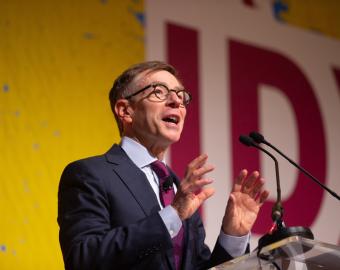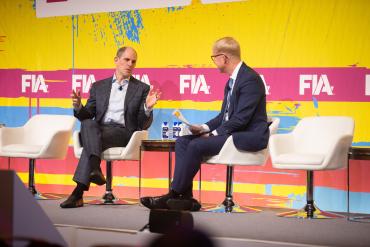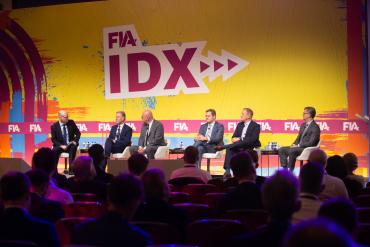Against a backdrop of significant geopolitical uncertainty, the impact of world events on derivatives markets featured as a topic of conversation across most panels and discussions at FIA's International Derivatives Expo in London last week. So too was the improved resilience of markets during these times of stress.
Three keynote speakers focused largely on the current geopolitical climate. Former Financial Times editor, Lionel Barber, provided fascinating insight into the fast-paced actions on the global stage, as possibly the only journalist to have interviewed three of its main actors: US President Donald Trump, Russian President Vladimir Putin and Israeli Prime Minister Benjamin Netanyahu. In short, we will continue to live in uncertain times for the foreseeable future.
Randy Kroszner, external member of the Financial Policy Committee at the Bank of England, kickstarted the conference with a speech and fireside chat on financial stability in light of global challenges, and how associated risks should be addressed by CCPs – the industry’s “shock-absorbers” – regulators and supervisors alike.
Referencing a BoE FPC statement in April, Kroszner pointed out that the probability of adverse events and the potential severity of their impact have risen. The potential for global economic shocks originating from increasing geopolitical risks, trade policy and global sovereign debt vulnerabilities sits front and centre of market participants’ and financial stability policymakers’ minds.
“In this context,” he explained, “the potential for globally correlated shocks that affect CCPs and markets around the world is increasing.”
This makes it important to understand how institutions will behave in stress and where the vulnerabilities in business models lie. Demand for derivatives has grown in volatile times, making the role of CCPs even more vital.
History has also shown that in times of stress, correlations tend to rise. Furthermore, the interconnectedness of CCPs and their clearing members can have systemic implications. It is important, Kroszner said, for CCPs and market regulators to consider this interconnectedness.
Despite the current climate, there are signs that markets are more resilient today. Significant improvements to market transparency were made after the financial crisis of 2008, and the understanding of risks has improved, he said.
The third keynote came from FIA Hall of Fame inductee Don Wilson, founder and CEO of the proprietary trading firm DRW Holdings. He sat down for a conversation with FIA’s Walt Lukken to provide a trader’s perspective on the state of the world. Setting aside the emotional impact of geopolitics, “you have to take a step back and look at it rationally and how it impacts probability distribution,” he said. “It won’t be a smooth path.”
Quizzed by Lukken on DRW’s crypto activities both with Cumberland, its cryptoasset trading business, and Digital Asset Holdings, focused on blockchain for traditional markets, Wilson pointed out that the technology, not the coin, first attracted his attention to the space. He continues to see value in the technology and the benefits of stablecoins, particularly in facilitating privacy in payments.
However, Wilson offered strong words about the European approach. “Europe is not embracing the technology in the same way,” he said. And while MiCA (Markets in Crypto-Assets) regulation was implemented last December, inconsistent applications of the rules have made it “almost impossible to conduct business in Europe.” This dysfunction is holding back innovation in Europe, he concluded.
Volatility has tested the markets
Other panels and speakers noted that the markets have performed well in what Wilson described as “an exciting year” of volatility so far. As Lukken pointed out in his opening remarks, efforts made by the industry to standardise trade flow and improve processing have paid off. Despite the highest volume day on record in April following President Trump’s tariffs announcement, the number of misallocated trades dropped by 50% compared to the height of Ukraine-related market volatility.
Eurex CEO Robbert Booij echoed this view, speaking on the exchange leaders panel, when he explained that exchanges performed well at the time of ‘tariffs day.’ Margin levels remained relatively stable and the recently announced pro-cyclicality buffers did their job, he said.
Other exchange heads agreed that markets had performed well. Euronext CEO and chairman of the managing board, Stephane Boujnah quoted substantial volume increases at his exchange group. He added that “assets that are supposed to be uncorrelated all went in the same direction.” ICE Futures Europe CEO Chris Rhodes described the growing sophistication of the products used to manage risk. More granular hedging by clients has led to increased use of derivatives and record open interest.
Commodity markets also performed well. London Metal Exchange had a record April, said chief executive Matt Chamberlain, showing it had learned lessons from the 2022 nickel crisis.
However, while volumes had somewhat normalised (prior to the US intervention in Iran) , Daniel Maguire, group head, LSEG Markets and CEO, LCH Group, warned that markets are only a social media post away from more volatility.
Meanwhile, a panel of clearing firm executives discussed the additional pressures placed on firms by changes driven not just by geopolitics and market volatility, but also by regulatory developments and those instigated by exchanges and CCPs. Per Haga with Barclays suggested that there are things that we can do to improve collateral movement to meet margin requirements with existing technologies.
Samina Anwar, global derivatives operations director, who also chairs the Derivatives Markets Institute for Standards (DMIST), an industry-governed standards body formed by FIA, agreed that there has been marked progress in operational efficiencies, thanks to the industry’s focus on such initiatives as DMIST, but that “more work is needed”.
Clearing members shared this view on a panel moderated by FIA’s Jackie Mesa. Panellists agreed that the industry had fared better during recent market volatility but that more work lies ahead, particularly in certain asset classes. From the CCP perspective, there was also a call for a reduction in the burden of reporting, not just a revision of the rules. Hester Serafini, president of ICE Clear Europe, noted her firm received 175 ad hoc requests from the Bank of England and the European Securities and Markets Authority, while US regulators sent only 35 such requests to ICE Clear Credit during the same period.
There was optimism about continued progress, however. As Anthony Attia, global head of derivatives and post-trade at Euronext, pointed out, innovation does not slow down during market volatility.
And Matthias Graulich, chief commercial officer at Eurex, underscored this point, saying, “We shouldn't expect regulators to do innovation. We, as the market, need to do innovation. And this tokenisation thing is a perfect example.”
Lukken’s opening remarks clearly captured the zeitgeist when he highlighted three solutions to improve markets: standardisation of trade flow through initiatives such as DMIST; modernisation of collateral movement through tokenisation; and the simplification of regulation.
The final event of the conference – The Great Debate – also struck a chord by considering the motion “This House believes markets are more powerful than politics.” It may have been the debating skills or simply a recognition of the state of the world, but those opposing the motion managed to persuade the audience that politics really are more powerful. They certainly are having a major impact on today’s markets.






